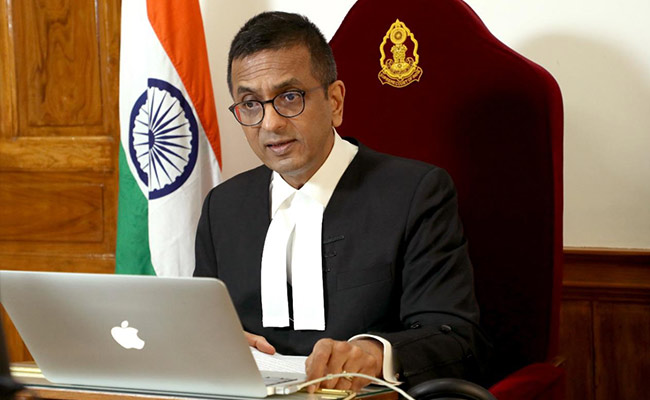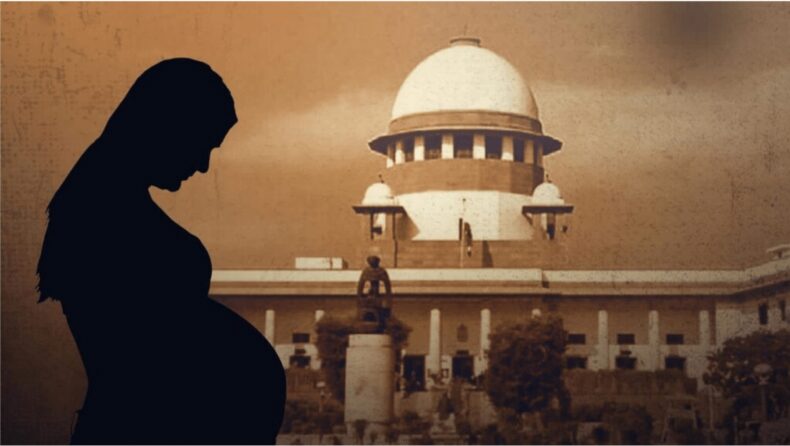Forced pregnancy of a married woman for the purpose of abortion can be treated as “spousal rape,” the Supreme Court ruled on Thursday in a landmark ruling on women’s reproductive rights and physical autonomy.
“Married women can also be part of the rape survivor class. Rape is non-consensual intercourse and intimate partner violence is real.”, said the judges, led by Justice D.Y. Chandrachud.
“Any pregnancies that are allegedly forcibly induced by a pregnant woman are rape.” Judiciary authorities, including Justices AS Bopanna and JB Pardiwala, also interpreted the MTP law to mean that unmarried women, like married women, could have abortions for up to 24 weeks.
Existing provisions of the law do not allow a single woman to have an abortion after 20 weeks of her life, but divorced women, widows and other categories of women are allowed to have an abortion up to 24 weeks.
“The law cannot create such artificial classifications on the basis of narrow reasons. “It would be an attack on a woman’s dignity to deprive her of this right,” Banks said.
A court heard a petition from her 25-year-old single woman who requested a 24-week abortion, and the Delhi High Court suggested she would be better off giving the child up for adoption. On July 21, the Supreme Court allowed women to continue their pregnancies if the Medical Board proved that the abortion was not life-threatening. and decided to also consider legal regulations regarding the distinction between married and unmarried women.
Federal Department of Health has defended the legal system and extensive debate preceded the drafting of the MTP Law and Regulations, ultimately excluding a separated single woman from the category allowing her to have an abortion up to 24 weeks claimed to have done so.
The law did not distinguish between married and unmarried women for abortions up to 20 weeks, but the center only allowed certain categories of vulnerable women, such as rape victims, minors, and women with mental illness, included in the legal classification of abortion up to 24 weeks.
In its July 21 ruling, the Supreme Court criticized the Delhi High Court for taking an “overly restrictive” stance in denying women the right to abortion.
“There is no reason to deny an unmarried woman the right to have a medical abortion when other categories of women have the same choice. “It’s an inseparable part. She has an unalienable right to her physical integrity.”
Denying an unmarried woman the right to safe abortion violates her personal autonomy and liberty, the court added to previous orders finding medical opinion safe It added that women could terminate their pregnancies at 24 weeks gestation if they did.
The Supreme Court, citing Section 3B(c) of the MTP Rules 2003, which allows a woman who has “changed marital status during pregnancy” due to widowhood or divorce to have an abortion, used the term “change in marital status during pregnancy” to course of pregnancy”. “Marital status” should be construed in a targeted manner to also include situations affecting single women.

History of Abortion Rights in India
Prior to the enactment of the Medical Abortion Act (MTPA) of 1971, abortion service providers and women faced up to three and seven years in prison, respectively, for performing and requesting an abortion. The only exception to this rule was when the pregnant woman’s life was threatened. In 1966, then Minister of Public Health and Justice Shantilal Shah said the law was too restrictive and needed to be liberalized.
This led to India’s first abortion law, under which abortion was legalized if authorized by a qualified doctor. The act, though progressive, was not a byproduct of the Indian women’s movement, but a means of gaining control over India’s rapidly growing population, especially in the lower socio-economic areas of the country.
Legal limits on gestational age (20 weeks) were repeatedly questioned. By 1971, he saw no reason to adhere to the 20-week limit, as medical facilities had developed allowing abortions at 20 weeks. In 2021, the new MTP law came into force, allowing abortions up to 24 weeks’ gestation under certain conditions.
The new law which earlier restricted sexual assault victims, minors, widows or divorcees, women with disabilities, women with mental illness, fetuses with physical or mental abnormalities, and women in emergencies. was expanded. According to UNFPA’s State of the World Population Report 2022, 67% of abortions taking place in India are unsafe.
Marital Rape in India
The Delhi High Court on May 11th, 2022, handed down a long-awaited ruling criminalizing marital rape. Unable to decide whether sexual acts committed by a man to his wife without consent should be considered a crime, the Court issued a split verdict. The issue is an exception to Section 375 of the Indian Penal Code. Unless the wife is underage, sexual intercourse by a man with his wife is not rape, even if it is done against the wife’s consent.
NFHS-5 survey on Marital Rape
The latest National Family Health Survey, NFHS-5, was conducted in two phases. Phase I ran from June 2019 to January 2020 in 17 states and 5 federal territories, and Phase II from January 2020 to April 2021 in 11 states and 3 federal territories.
- 6% of men aged 15 to her 49 have the right to be angry with their wives, the right to refuse financial assistance, the right to be violent in order to have sex, and another if women refuse sex.
- 72% of men aged 15 to 49 would not agree to any of the above four actions if their wives refused sex.
- 19% of men think they have the right to get offended and blame their wives for refusing sex.
D.Y. Chandrachud is known for his open-mindedness in the rather conservative society of India. His judgments and takes on various matter resonate with the progressive minds of India thus, making them believe in a better judiciary.
Read more: Roe v/s Wade Overturned in USA













